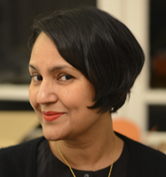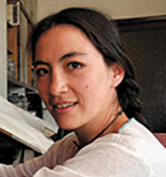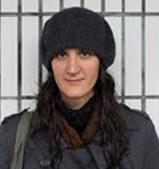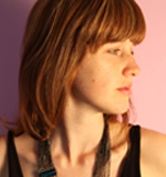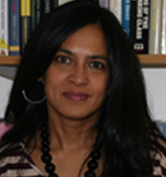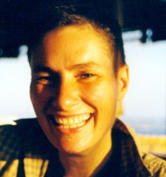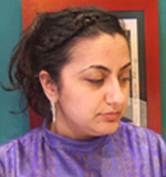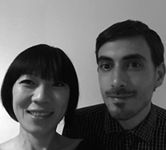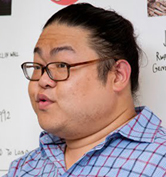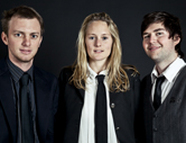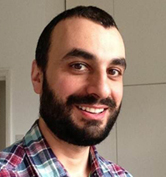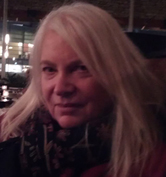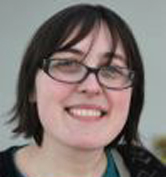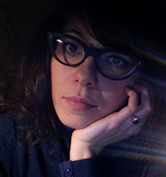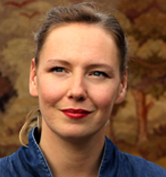ARTISTS
Sutapa Biswas was born in Santinekethan, India. Her poignant films and poetic artworks have been shown in museums and art galleries worldwide. She works in a wide range of media including installation, film and video, drawing and painting. Biswas’ works are represented in important public and private collections nationally and internationally, including: TATE Collections; Arts Council England; Reed College, Portland; Graves Gallery, Sheffield Museums and Art Galleries, Cartwright Hall and the Artist Pension Trust New York. Biswas was a Fellow at the Banff Centre for the Arts in 1990 and 1992. From 1989 to 2012 Biswas taught Fine Art at the Chelsea College of Art and Design, University of the Arts London, where in recognition of her contribution to fine art and her work as a lecturer, in 2006 she was appointed a Reader. Biswas lives and works in London, UK. |
|
|
aruma-Sandra De Berduccy is a visual artist born in Bolivia. Her work looks for the gesture of a weaver, unfolding through contemporary practices of art, understanding this gesture as a fingerprint, an evidence of the traditional weaver practices that still have validity as collective statement. Through several techniques and technologies, she explores the relationship between processes of the traditional Andean textiles and diverse artistic languages such as performances, photography, objects, video art, mapping, live cinema, and interactive installations.
In the last years, she has worked on the TEXT TEXTILE CODE project. It relates concepts, techniques and technologies of these three elements. Therefore, this project prolongs a creative process of multidisciplinary artworks that was undertaken seeking continuity with the traditional textile practice and its meaning in the contemporary context. www.sandradeberduccy.com |
|
Laura Cuch is a documentary and fine art photographer as well as a researcher at the Centre for Urban and Community Research at Goldsmiths, University of London. She currently teaches in the MA in Photography and Urban Cultures (which she graduated from in 2006), the Urban Photography Summer School and the BA in Social and Cultural Studies, also at Goldsmiths. From December 2010 to April 2012 Laura was a research fellow in the Department of Anthropology at Goldsmiths, which led to a solo exhibition, as part of the East London Photo Festival, and the conference ‘Negotiating Subjectivities: A One-Day Symposium on Photography, Health and the Body’.
|
|
Julio González Sánchez lives in Santa Cruz de la Sierra, Bolivia. An award-winning, self-taught artist with a graduate degree in architecture (UPSA) he has participated in many workshops and is a teacher and mentor. He has exhibited widely in galleries, foundations and museums both in Bolivia and internationally.
|
|
Yasmin Gunaratnam teaches in the Sociology Department at Goldsmiths. Her research is interested in narrative and stories at times of biographical change. She has a particular interest in migration and death and what the predicament of the dying migrant can tell us about the ethics and politics of multicultural hospitality. Yasmin also writes short stories and poems, her new book 'Death and the Migrant' will be published in November by Bloomsbury Academic.
|
|
Karin Michalski lives and works as independent film maker, artist and film and video art curator in Berlin. She studied Film Directing and Producing at the German Film and Television Academy Berlin (dffb) as well as Journalism and Political Science in Mainz and Berlin. With her films and videos such as i.e. The Alphabet of Feeling Bad (2012), Working On It (2008, Co-Director: Sabina Baumann), Monika M. (2004) and Pashke and Sofia (2003) she has been invited to numerous festivals and exhibitions. She is working as an independent feminist-queer curator for exhibitions and conferences such as the 54.th International Art Exhibition - la Biennale di Venezia in 2011 and the lecture series 'Engaging with Bad Feelings' at the Humboldt University Berlin and the Berlin University of the Arts in 2012.
|
|
Nirmal Puwar is a Senior Lecturer in Sociology at Goldsmiths, where she has worked for nearly nine years. Her work draws on multiple methods from inter-disciplinary sources to consider the encounters of bodies and space. She has co-ordinated a number of research projects on politics, space and inventive methods. She is keen to initiate and build on a form of creative and critical public sociology to be considered ‘Curating Sociology’. She is Co-Director of the Methods Lab http://www.gold.ac.uk/methods-lab/ She is the author of Space Invaders: race, gender and bodies out of place (Berg, 2003 and has co-edited a number of collections including: ‘Live Methods’ for Sociology Review (2012), with Les Back; South Asian Women in the Diaspora (2003) with P.Raghuram; ‘Post-Colonial Bourdieu’ for Sociological Review (2009); ‘Intimacy in Research’ in The History of the Human Sciences (2008) with M. Fraser; ‘Noise of the Past’ for Senses and Society (2011) with S.Sharma; as well as ten issues of the international journal Feminist Review, including Celebration Issue 100. |
FILMMAKERS
|
The Woman, The Orphan, and The Tiger Jane Jin Kaisen & Guston Sondin-Kung have worked collaboratively since 2009. They are invested in contested and emerging histories, places where historical truth is actively being disputed and its effects felt through traumatic dislocation. Through the mediums of film, performance, and writing, we are drawn to multilayered, fragmented, and diasporic perspectives, which recognize the subjective within history and take into account the various dynamics of power in a transnational perspective. Their film The Woman, The Orphan, and The Tiger (2010) has been exhibited at places such as Videonale 13 Kunstmuseum Bonn, The Taiwan International Documentary Film Festival, Yamagata International Film Festival, Nikolaj Contemporary Art Center, Korean American Film Festival New York, Vox Populi Galley, University California Los Angeles, DePaul Art Museum, among others. http://itinerantsendsforitinerant.org/ |
|
The Green Women and The Defenders of England
Jack Tan works in art and politics. He is especially interested in the performance of political structuring and social change (e.g. grassroots organising, urban ritual, law/policy-making, and social movements). He also considers their connections to place, habitations, material, objects and use. So far, Jack has made sculpture, video, writing, performance, teaching, discussion and exhibition. Currently, Jack is researching the performativity of civil rights and protest movements at the Drama, Theatre and Performance Department of Roehampton University, and is a Tutor on the Sculpture Programme at the Royal College of Art. |
|
Two Stories
Justin Archer, Martin Bleazar & Rosanna Scott co-directed Two Stories while students at Rhodes University completing their B.Journalism degree in 2012. Justin Archer, from Cape Town, also majored in economics. Martin Bleazard, from Johannesburg is passionate about film, representation, narrative and unearthing South Africa’s hidden stories. They both now work for non-profit organisation, the Sustainable Seas Trust producing film and animation on marine issues in the Eastern Cape. Rosanna Scott, who does freelance videography and documentary work. |
|
Dragging the Past
Konstantinos Panapakidis is a Visual Sociologist (PhD) with a background in photography, and graphic design. His research interests are gender, sexuality, and visual methodologies. He has taught photography, digital media, and research methods at Goldsmiths College, Kingston University, and University of Greenwich. His photographs have been published widely in magazines, and music websites. He lives and works in London. |
SPEAKERS
|
Allison Carter lives in Philadelphia and has been teaching in the sociology department at Rowan University in New Jersey since 1988. She graduated from University of Pennsylvania, got an M.A. at the New School for Social Research, and am ABD from York University in Toronto, where she studied with Alan Blum and Peter McHugh. She is currently enrolled at the Graduate Center at CUNY where she is working on a dissertation proposal with Stanley Aronowitz, William Kornblum, and Jerry Watts, comparing the popular culture (especially comedy) of ethnic cultures with collective identities that are centered on traumatic history. |
|
|
Rachel Clarke is a visual artist and researcher at Culture Lab, Newcastle University. Prior to joining Culture Lab in 2010, she worked extensively with communities nationally and internationally on participatory arts and media projects exploring issues of migration, heritage and identity. Her research now focuses on how participatory arts approaches can be sensitively adapted to inform the design of technologies for diverse community media sharing in the UK. |
CURATORS
|
Katalin Halász is a writer and artist researcher based in London and Berlin. She has written extensively on racism, minority and women rights, and equality. She also uses film, installation, and performance to explore embodied concepts of race, gender, and sexuality. Her artistic work revolves around the use of boundary-crossing strategies and the workings of emotions in the performance of the everyday and in visual art practices. She is currently working on a practice-based PhD in visual sociology at Goldsmiths College, University of London and is a fellow at InterArt, Free University, Berlin. Her recent works include Rewolucja, an award winning experimental short film (2011), Freeing Up Shame, a risk-taking participatory performance first staged in Brazil in 2012, and The Blush Machine, a multimedia performance installation shown in Bolivia in 2013. |
DESIGNER
|
|
